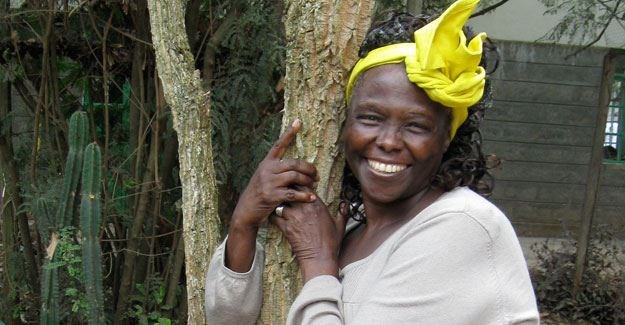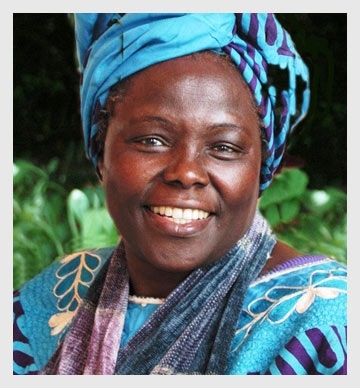 |
Do you like taking care of nature? Do you like sunshiny days, walking around the outdoors, surrounded by the dirt and rocky trails, pretty flowers, trees, and the sunlight? If you are that kind of person, then you need to know about Wangari Maathai. She is a woman who is a visionary environmentalist who has created a kind, successful reforestation program. It began in Kenya and later was adopted in other African nations and in the United States. Wangari Maathai was born on April 1, 1940 in Nyeri, Kenya. Later in life, she was "Attending colleges\universities in the United States, she went on to earn a B.S. from Mount St. Scholastica University, in Kansas and a M.S. from University of Pittsburgh, in Pennsylvania. She then earned a Ph.D. from the University of Nairobi. She was the first woman in Kenya to earn a Ph.D. and at age 38, she held the first female professorship (in Animal Science) at the University of Nairobi," (Newsmakers, 2005). After college, "She married a politician who unknowingly provided the basis for her future environmental activities when he ran for office in 1974 and promised to plant trees in a poor area of the district he represented. Maathai's husband abandoned her and their three children later, filing and receiving a divorce on the grounds that she was 'too educated, too strong, too successful, too stubborn and too hard to control,' according to the Mail & Guardian," (Newsmakers, 2005). Maathai is best known for creating the Green Belt Movement of Kenya. Wangari Maathai is a hero because she is caring, brave, and inspirational.
Wangari Maathai is caring because she cares about the outdoors, nature, and the environment. She taught people how to plant trees and flowers, and how to take care and treat them properly. (Wangari Maathai Tribute Film) Trees are important for the environment and for animals and humans because they provide oxygen, habitats, and medications. Wangari Maathai bravely stood up for her country, her people, her daughters, her friends, her family, and her ex-husband by stopping bulldozers that were going to knock down the jungle and take out the plants and repurpose the land. "Wangari Maathai believed that people needed to help with environmental issues and should not rely upon the government. Maathai clashed with the Kenyan government, often at risk to her own life, when she opposed destructive governmental initiatives and when she forayed into politics personally," (Newsmakers, 2005). She cared so much about the environment before it was politically or popular correct to care. She was willing to risk her life because she cared so much for her country and people. "In 2009 the United Nations Secretary-General named Wangari Maathai a UN Messenger of Peace, focusing on the environment and climate change. .In 2010, in partnership with the University of Nairobi, she founded the Wangari Maathai Institute for Peace and Environmental Studies (WMI), which couples academic research with the Green Belt Movement approach. ." (Newsmakers, 2005). Her caring led to greater understanding of the environment and the importance it plays. It also got other people involved in saving the environment. Wangari is a hero because she cared and was willing to save her environment. Wangari is brave. She stood up for her country. When the bull-dozers came she stood in front of them and would not let them knock down the forest. Then she went farther and "in 1977 Maathai left her professor position at the University of Nairobi and founded the Green Belt Movement on World Environment Day by planting nine trees in her backyard. The Movement grew into a program run by women with the goal of reforesting Africa and preventing the poverty that deforestation caused. Deforestation was a significant environmental issue in Africa and was resulting in the encroachment of desert where forests had stood," (Newsmaker, 2005). It was brave to give up a job that was secure to take care of the environment. She could have continued to work and no one would know, but she was brave enough to do what was important for her country. "According to the United Nations in 1989, only nine trees were replanted in Africa for every 100 trees that were cut down. Not only did deforestation cause environmental problems such as soil runoff and subsequent water pollution, but lack of trees near villages meant that villagers had to walk great distances for firewood. Village livestock also suffered from not having vegetation to graze on," (Newsmaker, 2005). She was brave to stand up against big businesses that were causing deforestation. She understood how important the environment was, not only to the people, but also the animals. She was brave when she developed a plan through the Belt Movement and put women to work planting trees and saving the environment. For these reasons she should be seen as a hero.
 |
Wangari Maathai is a hero because she is inspirational. "Women in the Kenyan villages were the people who first implemented Maathai's Green Belt Movement," (Encyclopedia of World Biography, 2004). "Under Maathai's direction in its first 15 years, the program employed more than 50,000 women and planted more than 10 million trees. Other African nations adopted similar programs based on the Green Belt Movement model. Additionally, the government stepped up its tree planting efforts by twenty times," (Encyclopedia of World Biography, 2004). She got women to help with the tree planting effort. Not only did she teach people how to plant and take care of nature, but she also did want other people to get attention for this and to spread the news so she can get as much help as needed for this project.
"Maathai continued to oppose modernization that collided with her environmental beliefs; this often put her at odds with government. She admitted that "You cannot fight for the environment without eventually getting into conflict with politicians." As an example, she was thrown out of her state office in 1989 when she opposed the construction of a 62 story skyscraper in Uhuru Park in Nairobi. Maathai claimed that the building, which was to house government offices and a 24 hour TV station, would cost 200 million dollars. The money, she claimed, could be better spent addressing serious poverty, hunger and education needs in the country. Her opposition succeeded in frightening off foreign investors and they withdrew their support; the skyscraper was never built. In Nairobi, Maathai also opposed the deforestation of 50 acres of land outside the city limits to be used for growing roses for export". (Encyclopedia of World Biography, 2004). She risked her life with the government as well while doing this project in Kenya. It helped the people because the project correlated with her environmental beliefs which did put her at odds with the government. She risked her life because she stood in front of the bulldozers when they were going to knock down the forest.
Who is Wangari Maathai? Wangari Maathai is "A visionary environmentalist, who created a successful reforestation program that began in Kenya and was adopted in other African nations and the United States. Maathai is perhaps best known for creating the Green Belt Movement of Kenya." (Newsmaker, 2005) "In 2002, Wangari Maathai was elected to the Kenyan parliament. Her activism in defense of democracy, the environment, and the poor of Africa won her the Nobel Peace Prize in 2004," (Newsmakers, 2005)Page created on 7/2/2016 12:00:00 AM
Last edited 7/2/2016 12:00:00 AM
